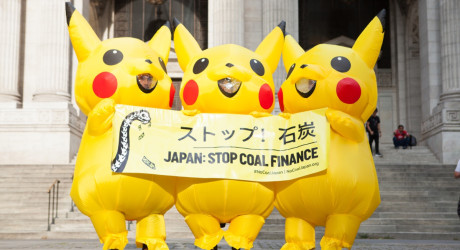ASIA
In Asia, we’re fighting the buildout of gas infrastructure and working towards an end to all finance for fossil fuels.
OVERVIEW OF WORK
One of the greatest threats to meeting the goals of the Paris Agreement is the buildout of gas infrastructure in Asia. As campaigners move from successful campaigns to stop coal buildout, Oil Change is working with partners across the region and internationally to increase awareness that gas is dirty, expensive and undermines development.
We are working with the Fossil Free Japan coalition to stop Japanese public finance for overseas gas, coal and oil projects and are also working to push the Asian Development Bank to stop financing fossil fuels.
LATEST PROGRAM POSTS
To coincide with the "GX Week" in Japan, a network of civil society groups from across the region and Global South have come together to call for Japan to stop financing false solutions and delaying the just transition to clean energy.
"The EU's new international energy strategy is woefully inadequate and would lock in decades' more extraction of deadly gas and oil," said Collin Rees.
This increases the number of signatories to 30 and the annual average of potential public finance shifted out of fossil fuels and into clean energy to at least USD 23.6 billion per year. This equals 37% of annual public finance for fossil fuels provided by G20 countries and the Multilateral Development Banks (MDBs) between 2018 and 2020.
Today at COP26, more than 20 countries and institutions launched a joint statement committing to end direct international public finance for coal, oil and gas by the end of 2022 and prioritize clean energy finance. This initiative could directly shift more than USD 18 billion a year of support out of fossil fuels and into clean energy.
LATEST PROGRAM RESEARCH
Despite the urgent need to phase out fossil fuels, Japan is driving the expansion of liquified gas (LNG) and other fossil-based technologies like ammonia co-firing, worsening the climate crisis and harming communities and ecosystems.
*Updated February 2024* Oil Change International analysis shows that several major countries continue to pump $6.2 billion in public finance into international fossil fuel projects despite committing to end this support by the end of 2022.
This briefing, "Japan's Dirty Secret: World's top fossil fuel financier is fueling climate chaos and undermining energy security," reveals that Japan is the world’s largest public financier of fossil fuel projects, providing 10.6 billion USD per year between 2019 and 2021. Japan has been leading the drive to expand gas consumption in Asia and is the world’s leading financier of gas infrastructure globally, spending USD 6.7 billion on gas projects on average each year between 2019 and 2021.


